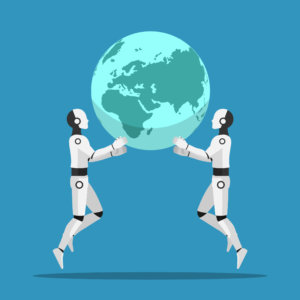High-Profile Jitters Over AI
Also, Kroger to build automated warehouses and why weather forecasting will never be perfect.
Topics
Elsewhere
Editor’s note: Elsewhere is a column that highlights ideas from other media platforms we believe are worth your attention.
So far, artificial intelligence has been widely viewed as a potential game changer for probing problems and making complex decisions. It’s well known, for example, that, powered by AI, DeepMind Technologies’ AlphaZero trained itself in 2017 to beat the best chess players in the world. It accomplished this feat in less than 24 hours, not by copying and tweaking the strategies of chess masters but by designing and executing new moves that others found counterintuitive.
But as AI finds its way into more and more facets of modern life, there are a lot of unknowns: How will it affect the various ways people think and interact with one another — and, more worrisome, how will it affect civilization?
In a recent Atlantic article, former U.S. Secretary of State Henry Kissinger, former Google CEO Eric Schmidt, and Daniel Huttenlocher, dean of MIT’s Schwarzman College of Computing, say “the changes [AI] will impose on human life will be transformative,” but not always in a good way.
For example, they note that historically, nuclear deterrence has been based on “the rationality of parties” and “the likelihood of retaliation deters attack.” But new weapons and strategies designed with AI, they worry, could turn things upside down (as AlphaZero did for chess), overwhelming existing models built on transparency and creating new levels of risk. They add that smarter and more sophisticated digital assistants and devices have minuses as well as pluses: fewer information choices for users, for instance, and less access to challenging ideas.
Although the three authors differ on how optimistic they are about AI, they all agree that, as AI becomes more ubiquitous, we need clear systems for keeping it in check. Among them: “requiring human involvement in high-stakes pattern recognition,” like reading X-rays; developing simulations to teach AI to identify ethical issues; and “auditing” AI decisions that touch on human values.
Get Updates on Leading With AI and Data
Get monthly insights on how artificial intelligence impacts your organization and what it means for your company and customers.
Please enter a valid email address
Thank you for signing up
Rebooting the Supermarket
For supermarkets, the race is on to develop business models that are able to compete with the likes of Amazon and, not incidentally, widen their paper-thin profit margins. One of the most aggressive efforts to date is coming from Cincinnati-based Kroger, which operates some 2,700 supermarkets in 35 states.

